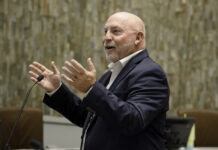An overflow crowd of local landowners, real estate and leasing agents, developers and others heard two professionals and two city officials tell them four slightly different versions of the same message at the city’s first update on its economic development plans: you’ve got to spend money if you expect business to bid on your land.
The hour-long forum was held Monday at Global Water.
They also heard that Maricopa is in heavy competition from Buckeye, Avondale, Casa Grande and other communities in luring heavy and light manufacturers and other large-payroll employers.
At the same time, Mayor Kelly Anderson and Councilmember Will Dunn emphasized that the city has progressed beyond some of the initial uncertainties and growth pains that saw Maricopa’s population increase from 1,500 people to 35,000 in just the past four years. They both claimed the city is on the verge of capitalizing on its investment in planning for future development.
“You can’t expect outside prospects to come in here and make an offer to buy or lease your land,” Dunn told the audience, “unless you’re willing to clear away the tumbleweed.” He referred to the fact that large businesses expect to see semi-developed tracts, with streets completed and utilities connected, before they will commit to a given site.
Pete Bolton, senior managing director of CB Richard Ellis in Phoenix, provided an overview of the state’s, and the area’s, general economic health. A former executive with Grubb & Ellis, Bolton serves on the board of the Urban Land Institute.
Referring to a map of the “megalopolis,” an area incorporating both the Phoenix and Tucson metro areas, Bolton said that Maricopa was ideally suited for major future development. “You’re between I-10 and I-8,” he said, “and the new road (a reference to SR 347) is great.”
Using an overlay of the city’s contiguous incorporated areas during a graphic presentation, Bolton compared Maricopa to large swaths of Phoenix, Mesa, Scottsdale, Chandler and Gilbert. “There’s a lot of good land out here,” he said.
He indicated there are some barriers to development, too.
Bolton referred to Arizona’s relatively high business tax structure, its higher-than-normal concentration of retail businesses, and its currently large inventory of homes as examples of negative influences.
Dr. Ioanna Morfessis, the city’s senior consultant on economic development, emphasized that about half of companies seeking new homes are seeking existing buildings to purchase or lease.
She said that 42 percent of inquiries made by the city or its representatives to owners of businesses in the last two years have been unsuccessful due to a lack of existing buildings and the relatively high price of local land.
Dr. Morfessis also referred to the need for Maricopa to foster the development of a regional airport. She said the city will review the results of an aviation study in January that will focus on five possible sites for such an airport.
The need for more and efficient roads also is a hot issue, she said.
At its next meeting, on Dec. 18, Morfessis said the city council will discuss creation of an industrial development authority. Such an authority, Morfessis said, could serve as “a conduit for issuing private activity bonds to provide lower interest rates at longer terms” to encourage investment in “utilities, affordable housing, redevelopment projects, and manufacturing facilities.”
In January, Morfessis said, council will discuss a resolution that would identify “blighted areas” in the city that could hinder development.
Adoption of such a resolution, she said, would pave the way for implementation of a redevelopment plan, the designation of a redevelopment district, and a central business district in what is now “old” Maricopa.
By next March, she said, the “Maricopa Prospector,” a new database matching commercial land owners with future developers, tenants and buyers, will be available on the city’s web site.
All property owners in and near Maricopa who wish to have their sites placed under consideration for commercial development were urged by Morfessis, Mayor Anderson, Councilman Dunn and others to contact the city, complete new data forms, and participate in discussions and other activities. The city has initiated a new “fast track” permitting system designed to help qualified new, expanding or reclocating businesses get up and running faster.
Danielle Casey, a city management assistant who works closely with Dr. Morfessis, encouraged land owners to contact her for more information about economic development or fast-track permitting. She may be reached by email at [email protected], or by telephone at (520) 568-9098.







![MHS G.O.A.T. a ‘rookie sleeper’ in NFL draft Arizona Wildcats wide receiver Jacob Cowing speaks to the press after a practice Aug. 11, 2023. [Bryan Mordt]](https://www.inmaricopa.com/wp-content/uploads/2024/04/cowing-overlay-3-218x150.png)




![Alleged car thief released without charges Phoenix police stop a stolen vehicle on April 20, 2024. [Facebook]](https://www.inmaricopa.com/wp-content/uploads/2024/04/IMG_5040-218x150.jpg)




